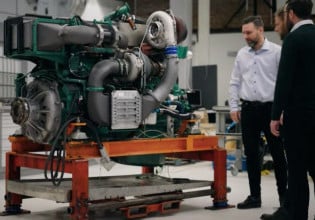Texas Instruments Announces Piccolo™ 32-Bit Microcontrollers With Real-Time Control
Texas Instruments Inc. (TI) announced a new series of 32-bit TMS320F2802x/F2803x microcontrollers (MCU). The new Piccolo™ F2802x/F2803x microcontrollers are said to feature architectural advancements and enhanced peripherals in package sizes starting at 38-pins to bring the benefits of 32-bit real-time control to applications typically unable to justify the associated cost. Real-time control is said to offer greater system efficiency and precision through the implementation of advanced algorithms for industrial, consumer and automotive applications such as solar power micro-inverters, LED lighting, white goods appliances and hybrid automotive batteries.
Piccolo F2802x/F2803x controllers can replace multiple electronic components to lower overall system cost while enabling advanced power electronics management. For example, in a variable frequency air conditioning unit, a single F2802x/F2803x controller can precisely control two electric three-phase motors as well as perform power factor correction (PFC) calculations. Currently required in approximately 30% of the world’s markets, including Europe, China, Japan and India, PFC is said to improve the efficiency of the load to make best use of the power from the utility.
Piccolo microcontrollers are said to offer the performance and integration to implement power line communications (PLC) for street light networks that allow cities to pinpoint power outages and centrally manage and adjust lighting based on time of day, traffic or weather conditions. The controllers also enable higher operating efficiency and control for solar panels. Typical solar systems use one inverter across multiple panels, but initial investigations have shown that individual micro-inverters connected to each solar panel within a system can drive higher power conversation efficiencies. Micro-inverters maximize the output of each individual panel compared to system wide inverters that maximize the average output of the panels as a complete system.
The Piccolo series of MCUs will feature advancements such as a programmable, floating-point control law accelerator (CLA) designed to offload complex high speed control algorithms from the main TMS320C28x™ CPU. The CLA, which will be available starting with the F2803x series, frees the CPU to handle I/O and feedback loop metrics, resulting in up to a 5x performance increase for common closed-loop applications.
TI’s patented, enhanced pulse width modulators (ePWM) support what is described as the industry’s highest resolution with frequency modulation down to 150 pico-seconds to enable more control over harmonics and reduce sample-to-output delay – a critical factor to avoid missing the falling edges of signals. At 4.6 MSPS, Piccolo devices’ on-chip, 12-bit ADC is up to four times faster than the closest competitor, allowing designers to reduce the complexity and cost of the design process, while achieving excellent accuracy and performance.
Two on-chip oscillators operating at 10 MHz each with +/- 1% accuracy eliminate the need for external oscillators and their associated cost. Many microcontrollers, in comparison, integrate ring oscillators, which have drift as high as 50%, rendering them unsuitable for reliable communication interface clocking. Piccolo oscillators also offer triple redundancy with on-chip self-test features to help designers achieve system-level safety certifications such as the IEC 60730 safety standard required for white goods in Europe. The simple power architecture eliminates the need for external power ICs and uses a single 3.3V supply with internal regulator down to 1.9V while providing brown-out protection and power-on reset.
The first Piccolo microcontrollers, the F2802x series, will be available for sampling in December and will include 40 to 60 MHz variations, up to 128 KB Flash memory, 12-bit ADC, ePWM and peripherals such as: communications protocols, on-chip oscillators, analog comparators and general purpose I/Os. F2802x devices will push the low-cost envelope with pricing at sub $2 each in volume. Future device introductions in 2009 will offer higher performance and memory sizes the CLA and LIN and CAN communications peripherals. Piccolo microcontrollers are 100% code-compatible with earlier-generation C2000 devices, allowing choices from the entire portfolio.






